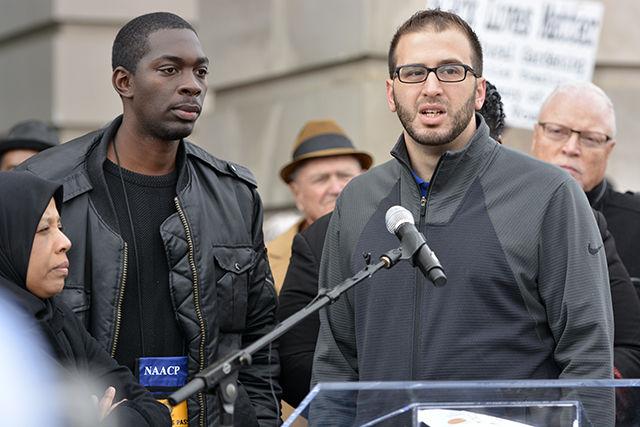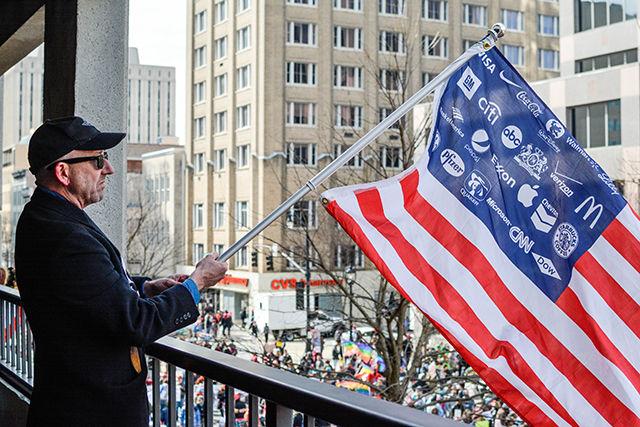Farris Barakat, the brother of Deah Barakat, spoke in front of several thousand people at the ninth annual Historic Thousands on Jones Street Moral March Saturday in downtown Raleigh.
Tuesday’s tragic shooting of Deah Barakat, his wife, Yusor Mohammad Abu-Salha, and her sister, Razan Mohammad Abu-Salha was on the minds of many of the speakers and marchers at Saturday’s protest.
“We have to learn to bring peace and justice to this earth so that we can hopefully pay a small price as a bullet to the head,” Farris Barakat said. “That’s a small price to pay for so much amazing glory in the next world.”
A crowd filling up two city blocks marched from the Raleigh Memorial Auditorium to the Capital Building after a pre-march rally at 9 a.m.
The march attracted dozens of speakers from throughout the state. Supporters cheered for speakers advocating for voting rights, a higher minimum wage, support for historically black colleges and universities, environmental legislation and women’s rights, among other causes.
The NAACP has organized a “Mass Moral March on Raleigh” for the past nine years as a way for groups to come together and protest “immoral” legislation and push for a policy reform.
The march has gained more attention in supporters in recent years. Last year’s march, which was dubbed the largest social movement in the South since Selma, drew tens of thousands at a time when the N.C. General Assembly was getting national attention for its conservative tax policies, environmental deregulation and social-program cuts.
During the pre-rally, an Imam, or spiritual leader of a Mosque, gave a Muslim call to prayer next to the Rev. William J. Barber II, head of the North Carolina NAACP and the chief organizer of the Moral Monday protests and marches on the legislature.
Barber pointed to Tuesday’s shooting as an example of how hate can be institutionally spread throughout a community.
“Our worst fears, as Job says, have come true when you see some people spew out words of hate, and those words somehow get in the minds of those that are hateful, and they do hateful things,” Barber said.
Calling the shooting hate crime, Barber compared the prejudices against Muslims to the long-standing history of racial discrimination against black people in the United States.
“We’re not going to label all Muslims like they used to label black men — as vile,” Barber said.
Nearly 50 years after the Selma civil rights movement in Alabama, the HKonJ movement continues to deal with issues of race and institutional racism in the U.S.
Protestors marched, sang and chanted with signs displaying hashtags such as #BlackLivesMatter and #HandsUpDontShoot, which have helped shine light on police brutality in the U.S. after news of the deaths of several unarmed black men by police has garnered national attention in recent months.
In early December, about 100 NC State students protested police brutality against black people by staging a “die-in” demonstration in D.H. Hill Library followed by a march to Western Boulevard. The protests were met with racist backlash on Yik Yak, an anonymous social media site.
Barakat said the media has played a role in his brother’s death by contributing to harmful stereotypes surrounding Muslims.
“They paid with their lives because they stood up for something that was demonized in the media,” Barakat said. “Maybe we haven’t stood up enough yet to say Muslims are Americans too.”
Manzoor Cheema, co-founder of the Raleigh-based Muslims for Social Justice, said the shootings were linked to rising trend of Islamophobia in the U.S.
Cheema said getting people to participate in social movements is necessary in order to continue working to end discrimination against marginalized populations.
“I think that is the only way we can end Islamophobia and racism,” Cheema said.
Mark Edwards holds an American Flag from a parking garage at the end of the HKonJ march in downtown Raleigh. The NAACP has organized a "Mass Moral March on Raleigh" for the past nine years and continued to do so this year. Several thousand people showed up to fight for issues such as more money for public schools and a higher minimum wage. Edwards said he attended the march "Because you have to get out a fight, stand up. Voting is not enough; we have to show them that we mean business. If a good number of people come out, they start paying attention to us."









